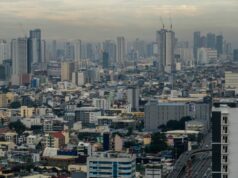Perks seen needed for in-country ore processing
THE GOVERNMENT’S push to extract more value from the country’s mineral resources by requiring more downstream operations to be performed in-country should be encouraged, along with incentives to attract more investors, a legislator said.
Speaking at the opening of the annual mining summit on Tuesday, Rep. Arnel U. Ty, Chair of the Natural Resources Committee, backed a recently filed House bill which intends to block raw ore shipments unless they are processed locally, “to get the most value from our country’s mineral wealth.”
“The value-add from processing plants will contribute significantly to the economy in terms of additional taxes and employment generated,” Mr. Ty said at the Sofitel Philippine Plaza Manila.
“However, we also recognize that a simple ore export ban will not work. We must also provide for the proper assistance and incentives to make investments in minerals processing more attractive and competitive, not just against others in the region, but most especially against China,” he added.
Mr. Ty also mentioned the pending revenue-sharing scheme which aims to raise the government’s share of the revenue gained from the export of ore.
“Any changes in revenue-sharing policy must consider… global competitiveness. Models for proposed changes in mining taxes must be tested carefully to maintain a fair balance and not cause any disadvantage to the industry’s sustainability,” Mr. Ty added.
Pending bills will raise the government’s share to 10% of a miner’s gross revenue, or 55% of adjusted net mining revenue (gross revenue less production and other deductible costs but not to exceed 10% of direct mining, milling and processing costs); and 60% of any windfall profit.
Miners, however, have insisted that the industry already gives its fair share to the government. A new revenue-sharing scheme is one of the conditions for lifting the ban on new mining projects in place since 2011 and extended indefinitely through Executive Order 79 signed in 2012.
Data from the Mines and Geosciences Bureau show that mining accounted for 0.6-0.7% of gross domestic product (GDP) beginning 2013 as well as 0.5-0.7% to total employment.
The country’s land area covers about 30 million hectares, some 3% of which is covered by mining contracts. Of this total, 0.3% is actively mined.
Sought for comment, Ronald S. Recidoro, executive director and officer-in-charge of the Chamber of Mines of the Philippines (CoMP) said halting raw ore shipments does not translate to getting the most of the country’s mineral resources.
“We want to see the country get more benefit from the minerals. We are all for it. But if the proposal is to solely ban the export of raw ore, that will not work,” Mr. Recidoro told reporters on the sidelines of the summit.
Miners have pointed out high power costs as a hindrance to competitiveness for downstream industries, as well as unpredictable government policy and high shipping costs.
Asked if downstreaming can be viable if investors are granted incentives, Mr. Recidoro said the benefits of such proposal will be reviewed.
“We need to study this. Off-hand, the easiest incentive to give would be Income Tax Holiday but there should also be assistance in terms of the power cost and the cost of transporting ore from one island to another,” Mr. Recidoro added.
“Other than that, there should be improvement in the red tape situation. In other countries, permits are easy to get,” he said.
Last month, legislators filed a bill that would require miners to secure a legislative franchise to operate. The bill also sought to ban the export of raw ore and mining in watersheds.
The CoMP said it has yet to the study the potential impact of the bill.
Earlier, Speaker Pantaleon D. Alvarez, one of the authors of the bill, said policies mandating mining firms to process or semi-process their mined ores before these commodities are exported will be a legislative priority of the government. — Janina C. Lim



